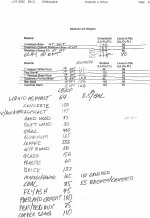EddieWalker
Epic Contributor
Cheaper is not better, or even as good as what you are supposed to use. If there is round rock in the mix, then it will never lock together and if the rock does not lock togheter, it will not shed water. If it doesn't shed water, it will absorb water. If there is water in your road, it will develop potholes, sink holes and soft spots. In other words, a total waste of time and money.
Road base rock needs to be at least four inches thick to accomplish anything. For it to lock together when compacted, it needs that thickness under ideal conditions. If you have soil that moves, freeze/thaw cycles and extreme conditions, then you need it to be thicker. How thick really depends on your location and usage.
Road base has many names, but it always looks the same. Busted up rock with sharp edges of all sorts of sizes from several inches down to very fine particles. This is critical for it to compact and become a solid mass. Once compaced, it will only come apart in large sections. Water will shed from it and heavy traffic can drive over it during heavy rains.
The type of rock that is used makes a difference. Some rock is soft and some is too hard. Mostly you are stuck with what's available, and we're really splitting hairs in even bringing it up. Mixing your rock gives you an unknown and there is no way to predict what you will end up with or how long it will last.
Cement Wash is also a cheap way to go, but you end up with round rock and sand. Neither work for a solid road, and in my opinion, it's a total waste of money for a road material.
Adding cement to the dirt is expensive and useless. It doesn not have any load carrying ablitiy, and will crack almost instantly.
A load of rock that is in the 22 to 24 yard range will give you a 4 inch road that is ten feed wide and a hundred feet long. Ten feel wide is plenty for a driveway. Is there a reason to go more then 12 feet wide? Local Code? I've had semi's come down my ten foot wide road many times without any problems. I've had my dozer picked up and hauled down my road without leaving any sign of it. My dozer weighs 40,000 pounds, so that's a pretty good sized load.
Keep it simple. Build up the road with good fill dirt to create a crown. Compact it. Address the drainage and give the water a place to go. Cover the dirt road with at least four inches of road base rock, or whatever it's called there, and compact it.
NEVER EVER drag a box blade or any other blade over the road once it's compacted. All you are doing is thinning the rock and speeding up the decaying of it. If you find that you have a low spot, add more rock to that spot. You will have to loosen up the existing rock to get it to mix and compact. Then compact it all together.
Eddie
Road base rock needs to be at least four inches thick to accomplish anything. For it to lock together when compacted, it needs that thickness under ideal conditions. If you have soil that moves, freeze/thaw cycles and extreme conditions, then you need it to be thicker. How thick really depends on your location and usage.
Road base has many names, but it always looks the same. Busted up rock with sharp edges of all sorts of sizes from several inches down to very fine particles. This is critical for it to compact and become a solid mass. Once compaced, it will only come apart in large sections. Water will shed from it and heavy traffic can drive over it during heavy rains.
The type of rock that is used makes a difference. Some rock is soft and some is too hard. Mostly you are stuck with what's available, and we're really splitting hairs in even bringing it up. Mixing your rock gives you an unknown and there is no way to predict what you will end up with or how long it will last.
Cement Wash is also a cheap way to go, but you end up with round rock and sand. Neither work for a solid road, and in my opinion, it's a total waste of money for a road material.
Adding cement to the dirt is expensive and useless. It doesn not have any load carrying ablitiy, and will crack almost instantly.
A load of rock that is in the 22 to 24 yard range will give you a 4 inch road that is ten feed wide and a hundred feet long. Ten feel wide is plenty for a driveway. Is there a reason to go more then 12 feet wide? Local Code? I've had semi's come down my ten foot wide road many times without any problems. I've had my dozer picked up and hauled down my road without leaving any sign of it. My dozer weighs 40,000 pounds, so that's a pretty good sized load.
Keep it simple. Build up the road with good fill dirt to create a crown. Compact it. Address the drainage and give the water a place to go. Cover the dirt road with at least four inches of road base rock, or whatever it's called there, and compact it.
NEVER EVER drag a box blade or any other blade over the road once it's compacted. All you are doing is thinning the rock and speeding up the decaying of it. If you find that you have a low spot, add more rock to that spot. You will have to loosen up the existing rock to get it to mix and compact. Then compact it all together.
Eddie

